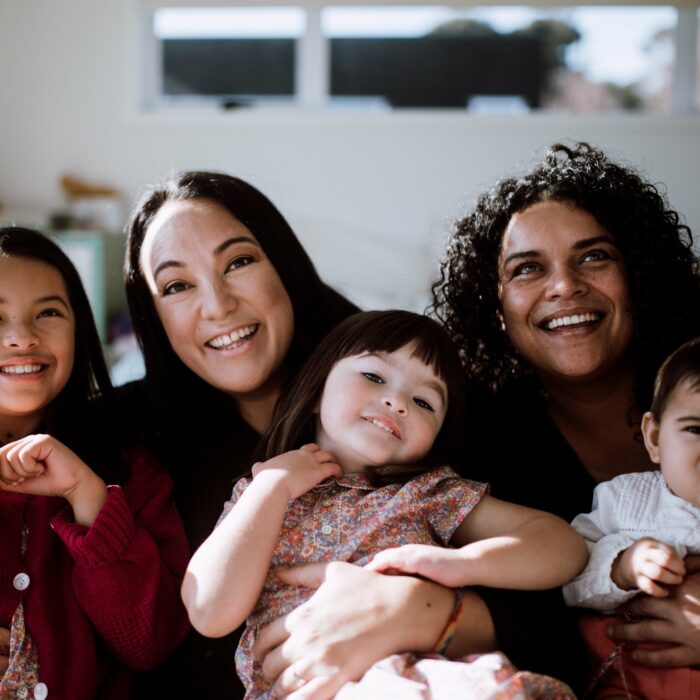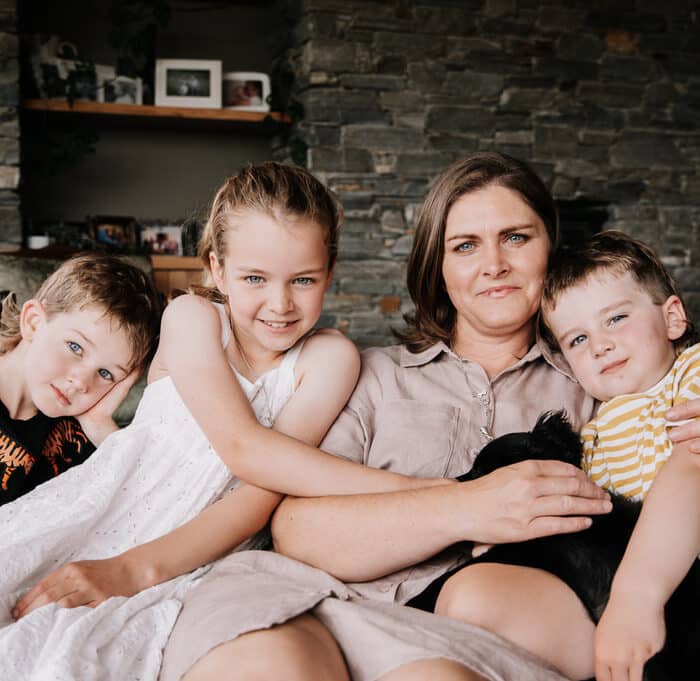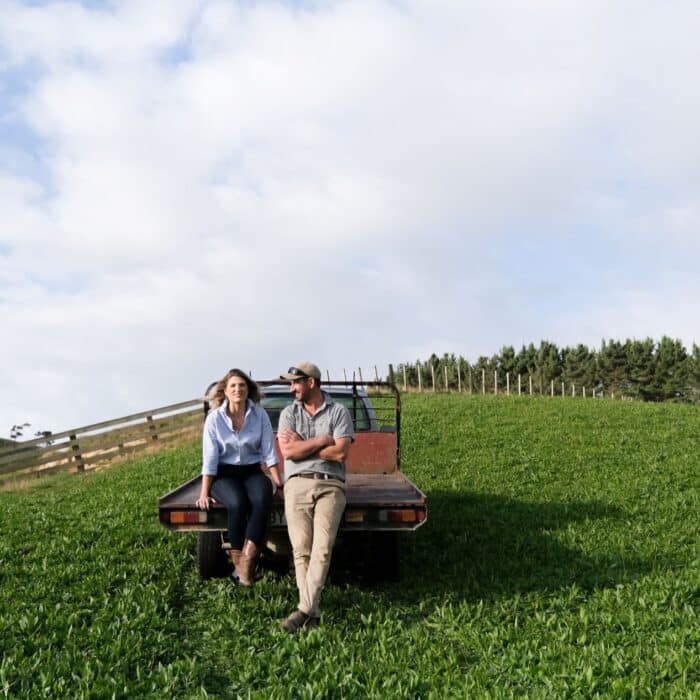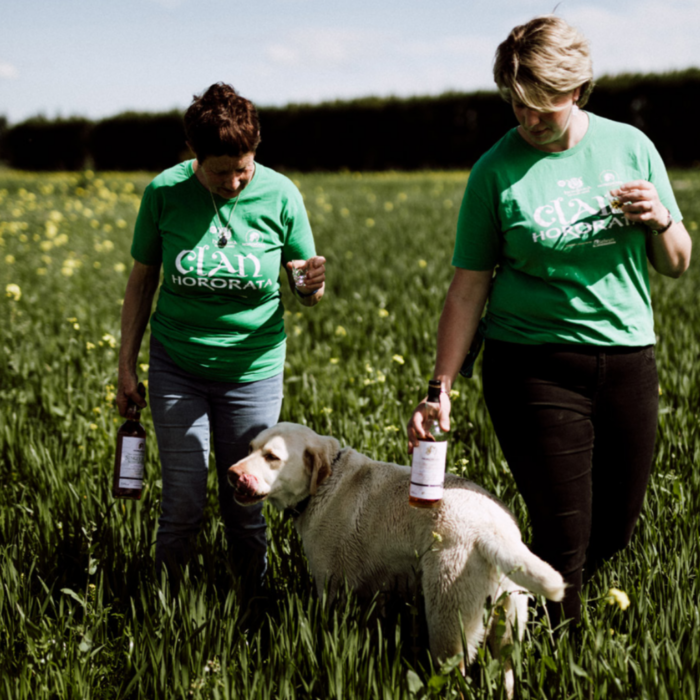12 March 2023
Living with a heavy heart: The children left behind when parents die early
WRITER: TESSA KING
PHOTOGRAPHER: MICHELLE HEPBURN (TESSA KING); REBECCA DWYER (RENEE WHITE); FRANCINE BOER (CAROLINE HARMSWORTH)
Losing a parent is hard, but doing so when young is particularly difficult – in many ways, it’s like a full stop marking the end of carefree childhood. We expect to have a lifetime of making memories with our parents, and the loss is fundamentally life-changing, with both emotional and practical implications that are difficult for those who still have one or both parents to comprehend. Waiheke Islander Tessa King, 40, still grapples with the loss of both of her parents when she was in her early twenties; here she speaks to Renee White, 26, who lives in Geraldine, and Caroline Harmsworth, 28, based in Wānaka, who both lost their mothers when they were in their teens, about their shared experience
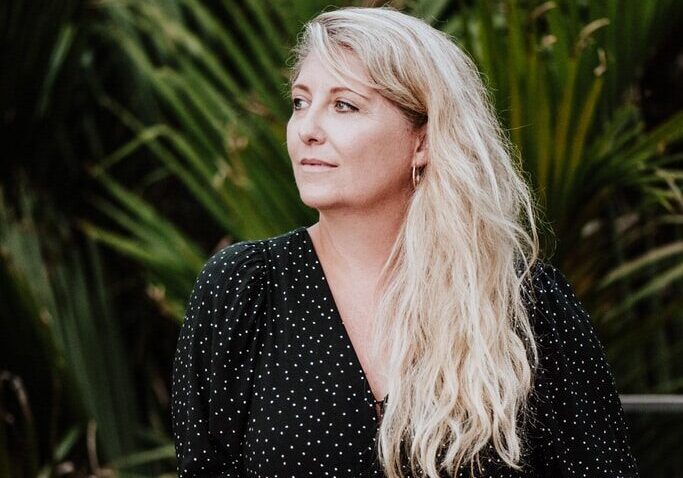
I was twenty-two when my mum, Felicity, died of the lung cancer that had spread to her brain. Four years later, my dad, Richard, died after suffering a massive heart attack. By twenty-five, I was an adult orphan; in some ways I barely even felt like an adult, in others I felt old well beyond my years. I still think about and miss both of them every day.
My mum was diagnosed with lung cancer at the age of fifty-six. She was single at the time, having separated from my father a decade earlier, and my older sister and I were both still living at home, working, studying and finding our feet as we entered adulthood. Fairly soon after diagnosis, Mum had an entire lung removed. Two weeks later she was pounding the pavement on Auckland’s Queen Street, proudly watching my sister in her graduation progression. You would never have guessed she was literally running on a half tank of oxygen.
The next few months are a bit of a blur, but I remember at one stage heading to A&E in an ambulance in the middle of the night with Mum, who was in so much pain she thought she must be having a heart attack. It turned out the pain was most likely her organs rearranging themselves to fill the hole left by her missing lung.
After a period where it seemed she was going to be okay – so much so, my sister and I went to Europe for three months backpacking – we found out the cancer had spread to her remaining lung, and this time there was nothing to be done.
I was at university by this stage, but my uni experience was pretty far from typical – I didn’t go flatting because it was just me at home with Mum for a period, before my sister moved back in. When everyone else was going to the student bar after class, I was mostly heading home to take over Mum’s care from one of her friends or my sister. I felt so alien and unlike my peers.
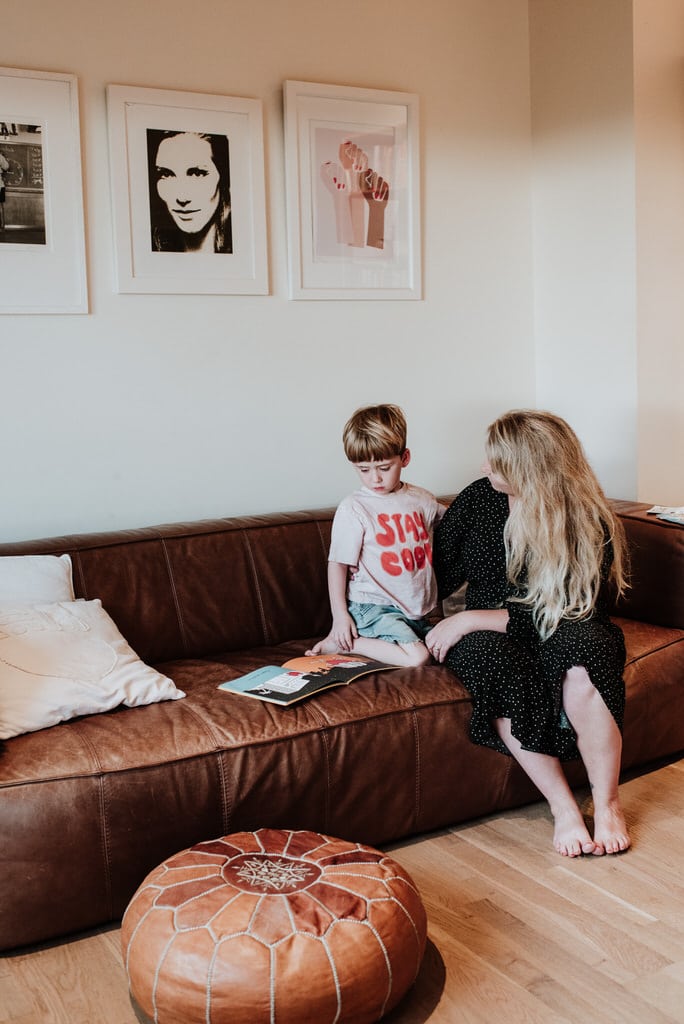
Even though she knew it was too late to be of any real help, Mum took part in a clinical trial of a new cancer drug – which meant a long stay in hospital and some very weird side effects – just in case it could help someone else in the future. During her last weeks in hospice, after we’d finally accepted we could no longer care for her at home, the resident pastor visited her room and asked her if she had faith. I remember her response: “I have faith in human kindness.” Very Mum.
In the last few months of Mum’s life, I bathed her, cut her toenails, massaged moisturiser into her swollen legs, tried to tempt her non-existent appetite with meals she had once loved. I mothered her, as she had mothered me. Her last weeks were a time of great confusion for her, as her mind failed her, and intense pain for us. The day that Mum died, my dad was in town – he’d flown up from Christchurch to support me and my sister and say goodbye to Mum. As the ‘death rattle’ softened, the nurse urged us to tell her we loved her, because people often have a moment of lucidity as they are passing over. We experienced the inevitable mix of extreme sorrow and relief she was no longer suffering.
My sister moved to London to join her boyfriend, which she would have done sooner in different circumstances, and at age twenty-two I became a landlord to two friends who came to live in our family home. I had to grow up very fast: house ownership, insurance, vet’s bills. I was aware that my experience of grief set me apart from my peers. It proved too much for some of my friends who, not knowing what to say, said nothing at all. (Tip: avoiding the topic completely is far, far worse than saying the ‘wrong’ thing.) I had more than one friend tell me I was “so lucky” to own a house, and then an apartment when my sister and I sold the family home, at that age – ignoring the fact that the sacrifice was my dear mum. Other friends, despite not having experienced this kind of grief themselves, seemed to know instinctively what to do.
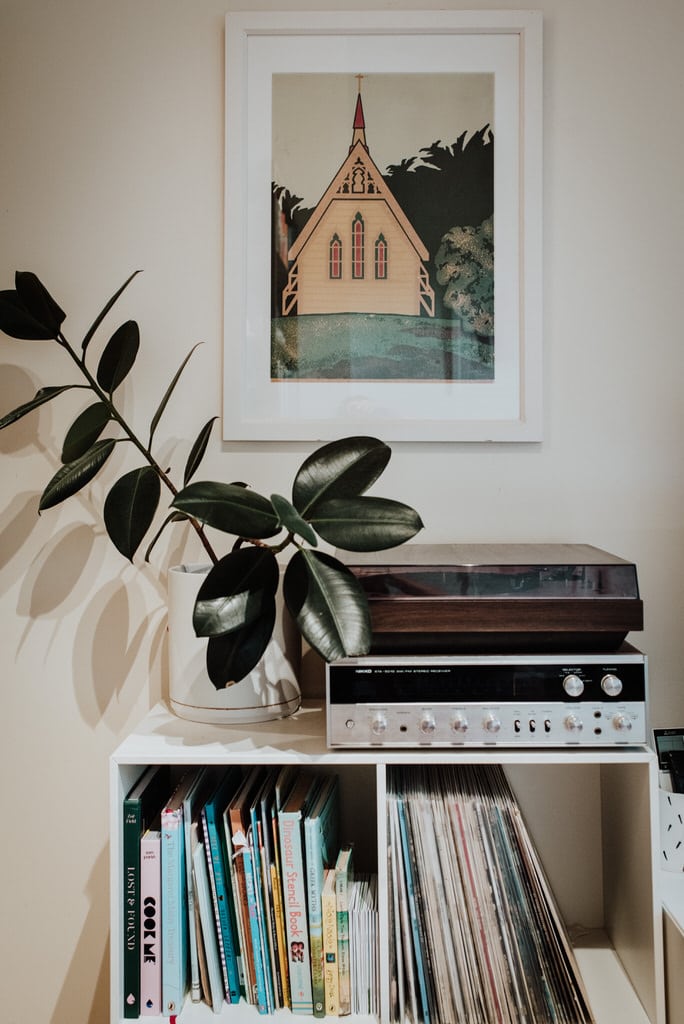
After a couple of relatively carefree years living in London, which allowed me to feel a little more like a normal young adult for a period at least, I took a phone call from my dad’s partner while I was at work back in New Zealand. My dad had suffered a heart attack and died. I remember slumping down the wall outside the staff room, and later fretting over the ridiculously trivial detail of a half-eaten lunch I’d left on the table inside – who would know to put it in the bin?
After the swift blow of grief I experienced with each death – one expected, and one a complete surprise; both immensely painful – it wasn’t until I had a child of my own more than a decade later that the grief ramped back up. When I struggled to get pregnant, I longed to be able to talk to my mum about her own struggles to conceive. She had never gone into details – I guess she thought she’d have time.
Then after my much-longed-for son was born, easily and joyfully, but with an awful first week of life spent in intensive care with low blood-oxygen saturation for him and severe sleep deprivation for me and his dad, I suffered a crippling and all-consuming grief. I just wanted my mum. As well as feeling sad that my parents wouldn’t get to meet him, and feeling the lack of parental support hugely, I felt an overwhelming responsibility to make up for the love that my son wouldn’t get from his grandparents – could I love him enough to fill the gaping hole? The fact my husband’s mum had died (at only sixty) a few years previously, and his dad lived all the way over in Scotland, made the hole even more pronounced. I lacked the cradling comfort of a home-base, a place to be cocooned and nurtured as a new mum – I felt, with a deep sense of sorrow, that I had no tūrangawaewae.



Today, I still feel very sad about the fact that my son misses out on that unique grandparently love, but being a mother myself has allowed me to feel a pure kind of happiness and contentment that had been missing for a long time – and the type of fierce, proud, at times utterly frustrated love that is reserved for a parent and their child. I also know that my son has many other people who love and care for him, and that we are lucky to have a family of supportive friends around us.
Another lasting effect of losing a parent young, and to a health condition, is that it can make you prone to health anxiety – and it mucks with your sense of mortality. I self-diagnose every niggle I experience as a brain tumour; it’s a constant effort not to catastrophise. There’s an irrational but persuasive part of me that doesn’t believe I will make it past the age my parents died – a feeling I’ve learnt is common amongst people who lost a parent when they were young.

I have been parentless almost my entire adult life. Recently, while out in the garden – a place that both Mum and Dad loved to be – I found myself thinking about all the little things that I have missed out on learning from my parents, things that would have been passed down gradually during visits over the years, in the natural way of things. How to keep tomato plants alive (Dad was particularly good at this – we placed some of his prized specimens on the casket at his funeral); how to not go completely bonkers when dealing with an incessantly crying, non-incessantly sleeping baby; how to make Mum’s baked polenta gnocchi dish so that it tastes as good as hers always did. How to be an adult.
I know my parents wouldn’t have had all the answers, but I’m sure they would have had soothing words to make up for any gaps in knowledge. I also know it’s easy to idealise or romanticise something you don’t have — perhaps they would have driven me nuts as we all aged, but I would have liked the chance to find that out.
We keep my mum and dad’s memories alive in little everyday ways: our four-year-old knows his middle name was a gift from his Grandad Richard, and I wear a ring that Mum inherited from her own mother as a wedding ring. A black and white portrait of Mum smiles down on her grandson from the lounge wall, and a print she was gifted by the artist Robyn White sits proudly opposite. We talk about my parents, as well as my son’s Scottish Grannie Annie, in a natural way around him, so that the memories become his. My parents have also influenced my life in more significant ways, and of course I wonder what they would say about it all – I’ve followed them into the world of words (Dad was a book publisher and designer; Mum a university librarian and book editor), and have ended up living on Waiheke Island, just over the hill from where they lived for a while in the seventies, before I was born.
The older I get – and the more elderly and less well I see my friends’ parents get – the more I realise that there is one saving grace of my parents’ early deaths: they will never grow truly old. I won’t face the prospect of having to see them in a care home with dementia, I won’t struggle with guilt over not visiting them enough. In my memory, Dad is still a fit, outdoorsy Canterbury adoptee – always happy to be out exploring those big, beautiful South Island landscapes; Mum is walking her dog, Bella, or out in her beloved garden – thankfully immortalised for me now not in her hospice state of emaciated body and mind, but in her pre-cancer loveliness.


Mum-of-two Renee White (Rangitāne o Tāmaki-Nui-Ā-Rua) was only fourteen when her mum, Hinemoa, died following an epileptic fit at just thirty-seven. “The closer I get to that age, the more I realise how young she was when she passed away,” she says. As well as the devastating emotional impact, there were practical implications of losing her mother at that young age. When her mother died, Renee had just started to get her period but hadn’t yet been taught how to deal with it. With four brothers and no sisters, and a father who was now distant, “ruined” by his wife’s death, Renee felt she had no one to turn to for advice.

There have been some really pivotal women in her life, however, who have stepped in to help. For a while she lived with her kuia, her mother’s mother. “Living with my nan was a saving grace for me in many ways and I wouldn’t be where I am without her love and patience with me during those years.” When she was seventeen, she moved in with a family from church. She calls the mother her “second mum, my Fijian mum”. There was also an aunt: her mother was one of nine, with six sisters, and while most of them lived in Australia, Hinemoa’s youngest sister was around. “She is another one who really helped me be who I am today,” says Renee. “I can’t thank them enough.”
Renee says her mother’s death made her childhood very different from the norm. “Before Mum passed away, I was very much a centre-of-attention, comedian, class-clown type of person – super confident – but after she died it was almost like a switch went off and if anyone looked at me I would go bright red and my whole body would burn. I turned into this really anxious, shy person.”

Teachers and others around Renee at school seemed unequipped to handle the grief she was experiencing. “I was in my second year of high school. When I returned after two weeks, my teachers acted as though nothing had happened. I later took a month off school because I would have breakdowns in the bathroom every day. But I don’t remember anyone from school checking in on me during that time off. It took me a long time to care about school, but I did gain good grades. I moved towns and schools when I was seventeen and I had one teacher there who really got me through school. He had lost both of his children in a freak accident, so he understood grief.”
Friendships changed, too. “I had a tight group of friends but after Mum passed away it was very lonely – they were still there, but not emotionally, and I felt I’d lost them. I remember one friend crying to me because she missed her mum, who was just away on holiday. Everything seemed so trivial. My friends now tend to be much older than me – I still find it hard to relate to others my age. Part of me is still a young girl who never grieved properly, but most of me is probably too mature for my age.”



Even within a family, people can deal with things in a very different way, which can compound feelings of loneliness. Some people want to talk everything through and openly mourn, others go inside themselves. Renee says, “I’d lost my mum and I thought that me, my dad and my brothers would come together and grieve together. Being the only girl, I needed to cry and talk, but my brothers and my dad were really different in the way they reacted.”
When she eventually became a mum herself, Renee suffered another wave of grief after the birth of her first child. “The grief came back like a tsunami – all the stuff I hadn’t been able to deal with as a child came flooding back, and it was a huge catalyst for what turned into postnatal depression. There’s not a day that goes by that my children don’t do something that I wish I could tell Mum about. We don’t have any support where we live, and I know we’re not alone in that, but just having someone, even if she wasn’t nearby, who you know would love your kid as much as you do – not feel obligated to spend time with them, not someone you have to pay to look after them. I still have to navigate it every day and just ride the waves. I had a miscarriage in between my kids, and that opened up the wound again – being a motherless mum. I have now met a few other motherless mums, which has been hugely helpful. It’s only more recently that I’ve been able to cry all the tears that I wasn’t able to cry over the past ten years. It’s been really healing being able to grieve in the way I need to.”

Health anxiety is something Renee also experiences. “It’s this fear I have now that I am going to die young and I won’t be able to see my children grow up. On Boxing Day we had a car accident. Thankfully no one was hurt, but I just couldn’t help thinking about how easy it would have been for us to have died. I had a lump in my neck recently, and I had to get it checked out with a radiologist. I went vegan for two years because I was worried about cancer.”
Renee has been without her mum for twelve years. “When I’m having a hard day, I imagine my mum dropping everything and coming to help out with the kids,” she says. “But I’ve asked people and most say it’s really not like that! In the past I really struggled when people complained about their mums, but now I’m a bit older I understand that everyone’s relationship is different. As a teenager, my relationship with Mum was strained at times. And I don’t have a lot of memories of her, partly because we weren’t encouraged to talk about her after her death and all the photos of her were put away, so the memories weren’t kept alive. But I try to focus on the happy memories, of her dancing or singing.”
Renee says she loves to hear her mother’s name. “The scariest thing for me about losing someone is that they won’t be remembered, that their name will stop being said. When I meet someone who has lost a loved one, I always ask the person’s name. To me, my mum’s name, Hinemoa, is the most beautiful name there is. Her middle name was Renee, and my daughter, Lyra, has Hinemoa as a middle name. If you have someone in your life who has experienced loss, don’t be afraid to show that the person is remembered. It means so much to me when someone sends me a message saying, ‘Hey, I saw this and thought of your mum’, for example. Then I know that she is not forgotten.”


Caroline Harmsworth, a teacher, was thirteen when her mother, Kathy, died of cancer at forty-two, after being diagnosed with Hodgkin’s lymphoma when Caroline was just five. For eight years, she and her older brother and father lived with the knowledge that her mother was going to die, a waiting game that caused a lot of anxiety at a time of life that is usually all about innocence and happy-go-lucky play.
By ten or eleven (and with her parents separated by this stage), Caroline had taken on a caregiving role, making meals and measuring out medication. As a result she had a very different childhood to others her age.
“It was supposed to be a ‘good’ cancer to have,” Caroline says of her mother’s illness. “Curable. But she was one of the five per cent of people for whom it is not curable. She had it for a long time so it impacted a lot of my childhood, and made it quite different to other people’s. My brother and I were prepped to know that she was going to die at some point. That was the worst part – the anticipation. Seeing if she would answer when I came home from school and said hello. Would she still be there? We were prepped on what to do if we came home and found her unconscious – all the possibilities.” Days at school were anxiety-filled. “We were prepared for who would come and tell us if she passed away while we were at school.”

Caroline’s classmates took their lead from her. Unable to process what had happened or properly grieve, she returned to school the day after her mum died. It was March of her first year of high school. She bottled up what had happened, created a “big black hole” in her memory, and so her friends did, too. “I just wanted to be like everybody else, but I was the polar opposite. I felt alone in the world,” she says. It was ten years before she could even talk about her loss, and it took hitting rock bottom. “It was my friends later in life who helped me to process it – old and new friends who knew my story – because they knew how to talk about it. They were good people who just knew what to do and what to say.
Caroline is also more conscious of her health because of her mother’s illness and death. “While the cancer my mum had wasn’t hereditary, it is still in the back of your mind: ‘Will I get it?’ It does make me take more care of my own health, and I feel a bit frustrated when I see people not looking after theirs. Seeing the reality of cancer, and chemo – it’s not something you would wish on anyone.”
To be reminded of her mother, all Caroline has to do is look down at her hand. She wears her mum's engagement ring, and another ring that is set with a family diamond. “The diamond was meant to be given to me on my eighteenth birthday, but as Mum knew she wouldn't be around to see that, she had it set in her wedding band for my thirteenth birthday instead.” Her brother has another of their mother’s rings, so they both have a little reminder of their mum. “I wear the rings most days and love looking down at them and remembering trying her rings on when I was young.”

Caroline has some supportive women in her life, and they help her to remember her mother. Kathy’s best friend Carol was like a second mum to her growing up, and still is: “She is a sounding board and has advice for every facet of life. She is also the toughest woman out – she has been battling cancer recently too, which has brought up mum and her experience in conversation a lot. That can be hard, but it's also nice to talk about her. I like it when people talk about things she would do, say I look like her, or that my personality or character is similar. It means she hasn’t been forgotten. My dad remarried, and I couldn’t help but feel envious at times of my stepsister’s relationship with my stepmother just because I didn’t have it. But both of them have been amazing; they both manage to remember details about Mum and talk about her, even though they never knew her. Without both of them I would be so lost in life, and I consider myself very lucky.”
It’s now fifteen years since Caroline’s mum died. “I’ve lived longer now without her than I did with her. I think about that often, at any milestone – birthday, graduation, Christmas. I sometimes wish other people would understand this more – the holidays suck. Mothers’ Day is particularly hard, and Christmas – days you just wish they were around for,” she says. “I would describe it as living with a heavy heart. It used to feel like it was so heavy all the time, and you could put happiness over the top, but it would always have that black bottom. Over time, it has gradually gotten less dark and there’s more room for happiness.”



Glossary. Kuia, grandmother. Tūrangawaewae, a place where we feel especially empowered and connected – our foundation, our place in the world, our home.

This story is part of THREAD, a year-long project by Shepherdess made possible thanks to the Public Interest Journalism Fund through NZ On Air.
If you enjoyed this story, please share with someone else.
Get your hands on a copy of Shepherdess.
